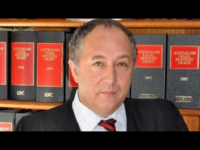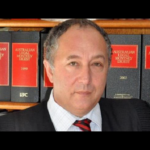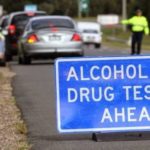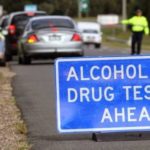Charged with Drug Driving? Have a Cannabis Prescription? Speak to Former Magistrate David Heilpern

Former NSW Magistrate David Heilpern is on a mission. It entails bringing about substantial reforms to the unjust roadside drug testing regime that’s currently operated by NSW police and only being bolstered by the Berejiklian government.
The first change Heilpern is lobbying for is that patients who have a legitimate medicinal cannabis prescription and are subsequently charged with drug driving, should be able to use that fact as a defence against any conviction.
Currently, there’s an ever-growing number of people being prescribed medicinal cannabis in this state and they can be charged with driving with its presence in their system, despite taking it for lawful reasons and not being impaired whilst driving.
The Turnbull government legalised a system of cultivating and manufacturing cannabis medicines in 2016, which includes the issuing of cannabis prescriptions.
Yet, authorities nationwide have done absolutely nothing to prevent cannabis patients from getting charged with drug driving as a result.
A drug war tactic
A lot of people in the community are under the misapprehension that when NSW police pull them over to the side of the road to test for drugs, this involves the same process as random breath testing for alcohol – meaning officers are testing drivers to see if they’re intoxicated.
But this is far from the case. Implemented in 2007, the current NSW roadside drug testing regime tests civilians for four specific substances: cannabis, cocaine, amphetamines and MDMA. However, police don’t test for impairment, officers actually test for the mere presence of these drugs.
This means that if a person who smoked a joint a week ago still has a trace of it in their system, they can test positive for drug driving. And on top of that, a person who legally takes cannabis medicine can test positive, lose their licence, and have to pay a fine, without any legal recourse.
So, what we’re looking at here is a system that’s ostensibly about improving road safety, actually being used as a backdoor means of charging people for illicit drug use. And in the case of medicinal cannabis, people are being charged over legal use.
Driving reform
Right now, Heilpern has put out a call to those in the community holding a legal medicinal cannabis prescription and have also been convicted of drug driving to come forward and speak to him about their experience to aid in bringing about change to prevent this from happening again.
Up in the Northern Rivers region of NSW where Heilpern used to sit on the bench, he’s renowned for having made landmark rulings relating to drug driving laws.
And since giving up the gavel, he’s been fiercely campaigning for the overhaul of the whole roadside drug testing regime.
Sydney Criminal Lawyers spoke to former Magistrate Heilpern about the medicinal cannabis drug driving defence, why he advocates for this being the first of a number of reforms, and how NSW authorities are sitting on their hands when it comes to these unfair laws.
Firstly, you’re currently lobbying NSW politicians to put forward a bill that would change state drug driving laws in regard to medicinal cannabis. Mr Heilpern, how would this work?
Anyone with a prescription for medicinal cannabis from a doctor would have a defence to the drug detection provisions only of the drug driving laws.
There are thousands of people who have prescriptions now. And if those people were detected, they’d have a defence.
Would this be operative at the time they were pulled over, or would they have to go to court to challenge a charge?
It wouldn’t apply to those who are driving under the influence: those adversely affected for driving wouldn’t be able to use the defence.
I envisage that a driver would still receive a notice. And the police always have discretion as to whether they charge people or not. So, police would obviously exercise their discretion where appropriate.
But if they didn’t exercise their discretion in not charging someone, then there’s the course of making representations to the police to have the charges withdrawn.
If that didn’t succeed, you could make a representation to the DPP to have them take over the prosecution and withdraw the charges.
Then, finally, if it did get to court – and I doubt many would if there is a bona fide prescription – then yes, you would have a defence to drive while being detected.
There was an unsuccessful attempt to do this a few years back in South Australia. But you say there’s a likely attempt happening in Victoria. What’s happening down there?
My understanding is there’s a bill before parliament. It’s been put up by Fiona Patten. And obviously, it would be extremely illogical if that defence was available in one state and not in others.
So, I hope that it brings about ground breaking change.
Since we last spoke in June, you’ve been doing a lot of campaigning against state drug driving laws. What have you been up to?
I’ve been speaking to a lot of media organisations, lawyers and politicians. But, mostly, it has been one way communication.
I’ve heard nothing and read nothing from the police or the road safety authorities or anybody else justifying these silly laws.
I suppose the reason for that is it’s pretty hard to justify the unjustifiable.
So, you’re conducting a call out for medicinal cannabis prescription holders who’ve been affected by state drug driving laws. What’s the response been like so far?
I’ve asked people to contact me who fit into that category. And dozens of people who have been caught drug driving with a prescription, and therefore lost their licence, have been in contact.
But, of course, asking them to go public is a big ask, because they fear targeting if they speak out. And most of them still continue to drive and use the prescription medicine. Indeed, all of them do.
In those circumstances, it’s pretty hard for them to go public, with all the publicity that it engenders.
They want to quietly go about their use of cannabis as a medicine, without drawing attention to themselves.
So, whilst many have contacted, it’s a very big ask for any of them to go public.
How can people contact you?
They can go onto Facebook and send a message to me there, or they can contact me through the legal firm Barefoot Law.
You’re a former magistrate well-known for having dealt with many cannabis driving cases.
Did you have people with a prescription for medicinal cannabis coming before you after being charged?
Hundreds.
So, it’s a common problem?
It is a very common problem.
Those who have medicinal cannabis are not immune from these laws. To use an equivalent, it could mean anybody who is prescribed any opioid at all could never drive.
It would put an end to that type of medication for many people. And that’s just not satisfactory.
You’ve become quite an ardent critic of these laws since you left the bench. You’ve commented that the reforms you’re pushing for now are not enough. What would be enough?
The whole regime should be abandoned. There is no road safety outcome. It costs an enormous amount of money to run. It causes untold harm to those who lose their licence.
It’s really a last gasp of prohibition, rather than anything to do with road safety.
Those road safety dollars and police time could be spent far more effectively on policing mobile phone use and speed, and on improving roads, and road safety campaigns.
Why we persevere with 200,000 tests in NSW is completely beyond me.
Considering there’s widespread recognition that these laws are problematic and the campaign against them has been going on for more than half a decade, why the reluctance of state authorities to even consider making changes?
You’d have to ask them that, because I really can’t think of any logical, economic, social or political reason not to change.
Where is the downside of the most minimal reform possible, that is allowing those with prescriptions to be able to drive with a detectable level in their system?
It would be a terrific trial of whether that suddenly leads to a massive outbreak in the road toll. And, of course, it wouldn’t.
The reason for the lack of change in our politicians is that firstly, they’re fearful of appearing soft on drugs and they’re gutless in that regard. This is not a soft on drugs approach.
The second thing is we need to ask ourselves who gains from this current regime.
Those who do gain are pharmaceutical companies, the alcohol industry and the black marketeers of synthetic cannabis – that doesn’t get picked up – and the drugs that are quickly out of your system, like amphetamines.
Of course, it doesn’t pick up a whole range of other drugs that are illegal – where the market is booming as a result – like LSD and magic mushrooms.
And lastly, Mr Heilpern, you’re set on changing the law for medicinal cannabis and drug driving. What’s the next step from here?
I will continue to lobby. I’ve received an enormous amount of support from the legal profession, the medical profession and members of the public.
So, I will keep up the good fight.
If you have been convicted of cannabis driving and you have a medicinal cannabis prescription, Mr Heilpern would like to speak to you. You can contact him on his Facebook page, or at Barefoot Law.
Going to court for a traffic offence?
If you are going to court for a traffic offence, call or email Sydney Criminal Lawyers anytime to arrange a free first consultation with an experienced, specialist traffic lawyer who will accurately advise you of your options, the best way forward, and fight for the optimal outcome in your specific situation.







